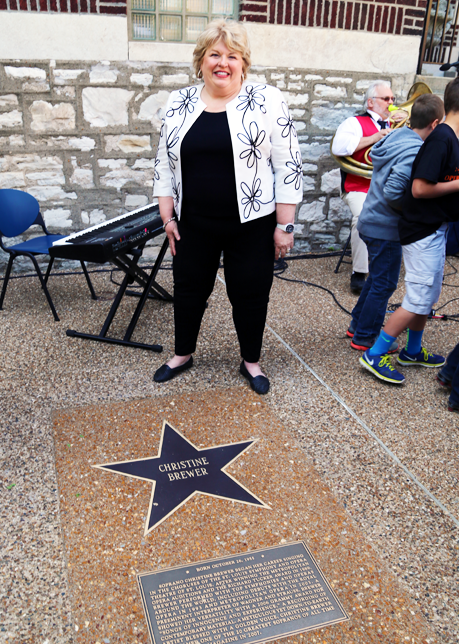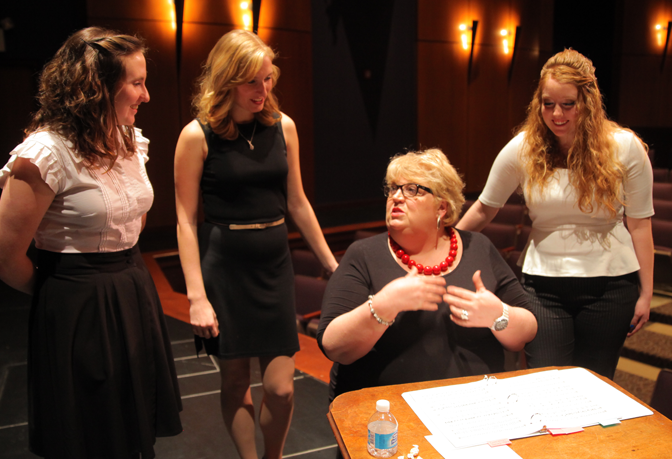Alumni Profile: Sound Advice
STAR SOPRANO CHRISTINE BREWER INSPIRES MASTER CLASS STUDENTS Christine (Burchyett) Brewer ’76 may be a Grammy-winning, internationally famous soprano, but she is not a prima donna.
After a master class on campus in January, the down-to-earth artist chatted warmly
with students, faculty and old friends - until Christine remembered she had dinner
in the crockpot and only then hurried home.
Christine (Burchyett) Brewer ’76 may be a Grammy-winning, internationally famous soprano, but she is not a prima donna.
After a master class on campus in January, the down-to-earth artist chatted warmly
with students, faculty and old friends - until Christine remembered she had dinner
in the crockpot and only then hurried home.
Celebrated for her interpretations of Wagner and Strauss, Christine was named one
of the 20 greatest sopranos of the 20th century by BBC Music Magazine in 2007. Experts cite her warm timbre and vibrant personality, and she has distinguished
herself because of her range, golden tone, boundless power, control and emotional
honesty.
“I have always loved making music. As a singer, I get to be a storyteller. That’s
maybe the most fun part of singing,” she said.
MASTERFUL HELP
Grateful for her opportunities, and the simple life she leads away from the spotlight,
Christine takes time to give back when she is at home in Lebanon, Ill., a few blocks
from her alma mater. Christine and her gregarious husband, retired social studies
teacher Ross Brewer ’76, met as McKendree students and were married in Bothwell Chapel on campus. They settled
in Lebanon when Ross, whose family lived in Belleville, Ill., was teaching in Freeburg.
Christine’s roots were in Grand Tower, Ill., a small town in Jackson County, so they
would not be too far from family members.
Christine earned her degree in music education and taught for a few years in Marissa,
Ill. A strong supporter of music programs, she developed an outreach program with
the Saint Louis Symphony Orchestra (SLSO) for sixth graders in Marissa. When the McKendree music department asks her to teach a vocal master class, she obliges.
In January, she met with twin sisters Dawn Schmid ’15, a musical theatre major, and Megan Schmid ’16, a music education major, of Columbia, Ill., and vocal performance major Haleigh Stevenson ’18 of Troy, Ill., - on the Hettenhausen Center stage.
When the McKendree music department asks her to teach a vocal master class, she obliges.
In January, she met with twin sisters Dawn Schmid ’15, a musical theatre major, and Megan Schmid ’16, a music education major, of Columbia, Ill., and vocal performance major Haleigh Stevenson ’18 of Troy, Ill., - on the Hettenhausen Center stage.
After each student sang, Christine offered feedback and advice on breathing, phrasing
and stamina. Sprinkling her tips with anecdotes, she made it personable, talking about
her thick Southern Illinois accent when she arrived at college and encouraging them
to take risks.
She told them to be patient, too. She matured into a more dramatic soprano in her
late 20s, early 30s.
As for interpretation: “You want the words to be very clear to the audience, and the
emotion … Know your story, or you won’t be able to tell it.”
Advice about taking care of your vocal cords was valuable. “They are the only cords
you are going to get,” she told them. And perhaps most important of all: “Just be
prepared to have fun.” She stressed preparation was key to lessening nerves.
“She was so friendly and down to earth that it was impossible to feel nervous once
the class began,” said Dawn. “I loved her help with interpretation of the lines. It
was great to hear that she tries weird things and goes back and forth on deciding
how to sing and characterize certain lines and phrases, just like I do. I am so happy
I had this opportunity before I graduated.”
Megan agreed. “I liked how she said that if we have not had certain life experiences
related to our songs that we could just pretend. I had never thought of it that way.
She said that looking back on pieces that she has done in the past, she can relate
to them differently than before.”
MUSIC FROM THE HEART
Growing up, Christine not only sang but also played the violin. “It brought me so
much joy. I used to rehearse duets by playing one part and singing the other part,”
she said.
Her high school chorus teacher was influential, as was her violin teacher during elementary
and junior high school.
“Both women saw and heard something in my singing and my violin playing that made
them challenge me.”
She had good role models at home, too.
“My mom, Deloris Craig Burchyett, had a strong soprano voice, and anyone who ever
heard her sing, remembered it. I would sometimes have her sing a couple spirituals
with me at the end of my recitals, and she would bring the house down. One of my voice
teachers told me that he was blown away by the power and honesty of her voice. I learned
so much from her.”
Christine saw her first opera when McKendree professor Glenn Freiner took some music
students to Southern Illinois University at Carbondale to see Mozart’s “Don Giovanni.”
“I was 17 years old. I had never seen anything like it, and I was hooked!”
THE WORLD STAGE
A singing career became a reality when she began in the chorus of the Opera Theatre
of St. Louis and was being paid as a section leader in the Saint Louis Symphony Chorus.
At age 33, she won the Metropolitan Opera Auditions and the Richard Tucker Foundation
Award in 1989. Managers approached her.
“Once I got management, I knew it was going to be a career,” she said.
As a first-time nominee, she won a Grammy Award for Best Classical Album and Best
Choral Album, in 2006, for “Songs of Innocence and Experience,” based on the poems
of William Blake.
Christine has sung at the world’s premier concert halls. She remembers her debut at
some of its greatest venues, including the Saint Louis Symphony Orchestra Chorus’
performance at Carnegie Hall.
“It was the first time I had ever flown on an airplane and the first time I was in
New York City. What a thrill! But when I went back a few years later to sing as a
soloist with an orchestra at Carnegie Hall, I did have a few weepy moments backstage
in my dressing room.”
Her Hollywood Bowl debut was memorable. “It was also the first time I had ever sung
Mahler’s 8th Symphony, which is also called “The Symphony of a Thousand,” because
there are so many people on stage performing. There is a huge orchestra, eight soloists,
an adult chorus and a children’s chorus. I was so nervous!”
Another night at the Los Angeles landmark sticks in her mind. “We were doing Wagner’s
“Götterdämmerung (Twilight of the Gods),” and when we got to the final half hour,
Brünnhilde’s Immolation, the stage manager asked me how I was with fire on stage.
Now, this wasn’t a staged performance. We were singing in concert gowns and tuxedos.
But I was the only one on stage for this final scene and they had built a little ring
that would I was to stand inside. There were little holes in the ring and gas jets.
And sure enough, they lit those at the appropriate moment and the flames surged up
around my flowing concert gown! Evidently, there were also fireworks shooting off
the top of the Hollywood Bowl as Valhalla was destroyed and all the gods were killed
by Brünnhilde’s act of redemption. The crowd went wild!”
Christine has built an illustrious reputation as a pre-eminent interpreter of Strauss
and Wagner.
“I think my voice and my temperament are well suited for his music. I love the way
Strauss’ music pulls at my heartstrings and the way it soars. In some ways, the phrases
make me feel a bit like I did when I played the violin. So I do have a special place
in my heart for Richard Strauss,” she said.
“I truly believe music is the universal language,” Christine said. “I love to tell
children that no matter what country I’m in, we can all open our scores, and even
if we don’t speak the same language, we can play and sing the music that’s on the
page. That connects us in a very deep way.”
Excerpted from an article by Lynn Venhaus that appeared in the Belleville News-Democrat BND Magazine, April 5, 2015.
